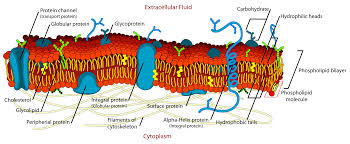记忆方法
将“membrane”分解为“mem-”和“-brane”。联想“mem”像记忆的记忆(记忆层),而“-brane”可以想象为“brane”是“bread”(面包)的变种,代表一层层像面包一样的薄膜。这种方法将抽象的单词与具体形象联系起来,有助于记忆。
以上内容由AI生成, 仅供参考和借鉴
中文词源
membrane 包膜,身体内的膜,植物的细胞膜
来自拉丁语membrana,皮肤,membrum,肢体,四肢,器官,部分。引申词义身体内的膜,植物的细胞膜。
英语词源
- membrane (n.)
- early 15c., "thin layer of skin or tissue," a term in anatomy, from Latin membrana "a skin, membrane; parchment (skin prepared for writing)," from membrum "limb, member of the body" (see member). The etymological sense is "that which covers the members of the body."
权威例句
- 1. The membrane of a bat's wing is interdigital.
- 蝙蝠翅膀的膜是长在趾间的.
- 2. These are substances which specifically latch onto the protein on the cell membrane.
- 这些物质专门依附在细胞膜的蛋白质之上。
- 3. A vibrating membrane in the ear helps to convey sounds to the brain.
- 耳膜的振动帮助声音传送到大脑.
- 4. Spores form a lipid membrane during the process of reproducing.
- 孢于在生殖过程中形成类脂膜.
- 5. The apical membrane of the epithelial cells is apparently essential.
- 上皮细胞的顶膜显然是必要的.
